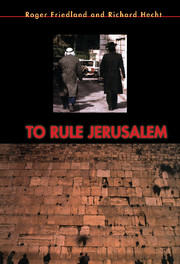Book contents
- Frontmatter
- Contents
- List of Illustrations
- Preface
- Acknowledgments
- Introduction
- 1 A Fearful Fusion
- Part I The Two Zions: Jews Against Zionism in Jerusalem
- Part II Zion Divine: Jerusalem as the Messianic Central City
- 6 A Few Footsteps for the Messiah
- 7 Staking the Claim in Judea and Samaria
- 8 Building the Capital
- 9 Suburbs of the Messiah
- 10 Defensible Borders
- Part III Birth of a Nation
- Part IV Heart of Stone
- Notes
- Index
7 - Staking the Claim in Judea and Samaria
Published online by Cambridge University Press: 13 May 2010
- Frontmatter
- Contents
- List of Illustrations
- Preface
- Acknowledgments
- Introduction
- 1 A Fearful Fusion
- Part I The Two Zions: Jews Against Zionism in Jerusalem
- Part II Zion Divine: Jerusalem as the Messianic Central City
- 6 A Few Footsteps for the Messiah
- 7 Staking the Claim in Judea and Samaria
- 8 Building the Capital
- 9 Suburbs of the Messiah
- 10 Defensible Borders
- Part III Birth of a Nation
- Part IV Heart of Stone
- Notes
- Index
Summary
Israelis entered the 1967 war feeling alone, inhabitants of a vulnerable sliver of territory. Yet in the wake of its tremendous victory, the Labour government's first impulse those first months was to exchange much of the land that had been won for a separate peace, not with the Palestinians, but with King Hussein's Jordan. Prime Minister Eshkol pressed for a formal peace treaty with all the Arab states. While the government was already planning strategic settlement on the Jordan River and around Jerusalem, Abba Eban, Israel's foreign affairs minister, was telling Arab leaders that “everything” was negotiable. Three months after the war, the Arab world's answer at Khartoum was an unequivocal no: no to negotiations, no to peace, no to recognition.
In the face of this implacable Arab hostility, most Israelis felt it was their right to take what history had given them by no fault of their own. “The feeling in Israel,” Mordechai Gur told us, “was ‘OK, so maybe that's how history decides it should be.’” The Labour government was nonetheless internally divided, as it has always been, over the negotiability of the territories. Whereas many Labour leaders saw much of the land as bargaining chips to be exchanged for demilitarization and Arab concessions on Jerusalem, others argued there was no going back. They had fought for keeps.
Zionists had always sanctified the land, had cultivated a profound sense of moledet, or birthplace. Boy Scout troops criss-crossed the countryside; schoolchildren learned to identify each species of bird and flower; young men and women trekked through the deserts with little water.
- Type
- Chapter
- Information
- To Rule Jerusalem , pp. 163 - 179Publisher: Cambridge University PressPrint publication year: 1996

